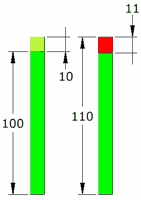How To Find Percent Rate Of Change
Percentage Change
Subtract the old from the new, and so divide past the old value. Show that as a Percentage.
Comparing Old to New
| | Change: subtract old value from new value. Instance: You had five books, but at present have seven. The change is: 7−5 = two. |
| | Percent Change: bear witness that modify as a percent of the old value ... and so divide by the old value and get in a percentage: So the percentage modify from 5 to seven is: two/v = 0.4 = 40% |
Percentage Alter is all near comparing old to new values. See percentage alter, difference and error for other options.
How to Summate
Here are two ways to calculate a percentage alter, use the one you prefer:
Method 1
| Step i: Summate the change (subtract old value from the new value) |
| Step 2: Carve up that change by the old value (you will get a decimal number) |
| Step 3: Convert that to a percentage (by multiplying by 100 and adding a "%" sign) |
| Annotation: when the new value is greater then the former value, information technology is a percentage increment, otherwise it is a decrease. |
Method 2
| Step 1: Divide the New Value past the Erstwhile Value (yous will get a decimal number) |
| Stride 2: Convert that to a percentage (by multiplying by 100 and calculation a "%" sign) |
| Step iii: Subtract 100% from that |
| Annotation: when the result is positive information technology is a percentage increase, if negative, but remove the minus sign and call it a decrease. |
Examples
Example: A pair of socks went from $5 to $6, what is the percentage change?
Answer (Method 1):
- Pace 1: $five to $six is a $one increase
- Step two: Divide past the old value: $i/$5 = 0.2
- Step 3: Convert 0.ii to percentage: 0.2×100 = 20% ascent.
Answer (Method 2):
- Footstep 1: Split new value by sometime value: $6/$5 = 1.2
- Step 2: Convert to percentage: ane.2×100 = 120% (i.east. $6 is 120% of $5)
- Stride 3: Subtract 100%: 120% − 100% = xx%, and that means a 20% rise.

Some other Case: There were 160 smarties in the box yesterday, but now there are 116, what is the percentage alter?
Answer (Method 1): 160 to 116 is a subtract of 44. Compared to yesterday's value: 44/160 = 0.275 = 27.5% decrease.
Answer (Method two): Compare today'southward value with yesterday'southward value: 116/160 = 0.725 = 72.five%, then the new value is 72.five% of the one-time value.
Subtract 100% and you become −27.five%, or a 27.5% decrease.
Why Compare to Former Value?
Because yous are saying how much a value has changed.
Case: Milk was $2, at present it is $3, did it rise $1 compared to $2 or $three ?
We compare to the original $2 value, so nosotros say the change is $one/$2 = 0.5 which is a l% increase.
The Formula
Y'all tin can also put the values into this formula:
New Value − Erstwhile Value |Quondam Value| × 100%
(The "|" symbols mean absolute value, and then negatives become positive)
Case: There were 200 customers yesterday, and 240 today:
240 − 200 |200| × 100% = forty 200 × 100% = 20%
A twenty% increase.
Instance: But if there were 240 customers yesterday, and 200 today we would get:
200 − 240 |240| × 100% = −twoscore 240 × 100% = −16.6...%
A 16.6...% decrease.
How to Reverse a Rise or Fall
Some people think that a per centum increment can be "reversed" by the same percentage decrease. Only no!
Example: 10% of 100
A 10% increase from 100 is an increase of 10, which equals 110 ...
... merely a 10% reduction from 110 is a reduction of 11 (x% of 110 is eleven)
Then we ended up at 99 (not the 100 we started with)

What happened?
- ten% took usa upwards 10
- Then 10% took the states downwardly 11
Considering the percentage rising or autumn is in relation to the old value:
- The 10% increment was practical to 100
- But the 10% decrease was practical to 110
How to exercise it properly
To "contrary" a percentage rise or fall, apply the right formula here:
| To Reverse: | Utilize this Pct: | Example x% |
|---|---|---|
| An "10" percent rise: | 10/(i+ten/100) | ten/(1+ten/100) = 10/(1.ane) = nine.0909... |
| An "x" pct autumn: | x/(1−x/100) | 10/(1−x/100) = 10/(0.9) = xi.111... |
| Or use this handy-cracking estimator (simply blazon in a value and click in the other box) |
Source: https://www.mathsisfun.com/numbers/percentage-change.html
Posted by: gasparhossing.blogspot.com


0 Response to "How To Find Percent Rate Of Change"
Post a Comment